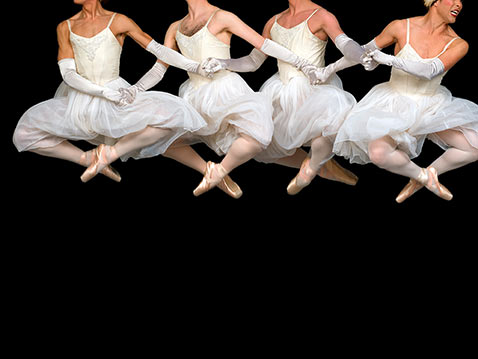Rebels on Pointe
Director Bobbi Jo Hart

For 40 years, all-male ballet troupe Les Ballets Trockadero de Monte Carlo has entertained and wowed audiences worldwide with their expertly executed and parodic style. In her documentary Rebels on Pointe, Bobbi Jo Hart takes a loving look at the troupe and what has made them such a celebrated act for decades.
What inspired you to make the documentary?
As a filmmaker, I tend to gravitate toward stories about people and ways of life we often do not understand, and to focus on the common human threads that connect us — be it dreams, identity, love, determination, family, success, failure, happiness, sadness and that elusive alchemy of finding and pursuing our purpose in life. A few years ago, Les Ballets Trockadero de Monte Carlo came to Montreal, and when I saw their outrageous photo in ballet drag in the local newspaper, I was absolutely intrigued to know who the human beings are behind the make-up and elaborate costumes. Luckily when I called their Artistic Director Tory Dobrin, he graciously granted me permission to film behind-the-scenes of a Montreal performance for research purposes. I fell in love with the company and their passionate pursuit of such a unique take on ballet, not to mention their unabashedly open sense of self-expression. I also admit that I became even more intrigued that night with the dancers — who were a global tapestry of men from America, Europe, Africa, South America and Asia. Each so different yet they were like a travelling family circus of caring human beings who had such a deep love of ballet and dancing on pointe since a very young age.
But deep down, I suppose I felt a kindred connection, as I realize I have for most of the people whose lives I have followed in my films over the past 20 years — seeing them as fellow gypsies if you will, on their unique caravan moving from place to place, searching for life’s meaning, as well as a safe place to call home and an environment to pursue their dreams. I grew up moving around a lot, with often very tumultuous family circumstances, and perhaps I am drawn to characters who help me understand a bit more about myself in some ethereal way. One thing I do know is that I have a deep passion to help our world be a more peaceful, accepting, and happy place… and in a small way, I try to build bridges of human connection and understanding and empathy — to celebrate our unique diversity and differences while at the same time reminding us how similar we all are on a soulful, human level. And yes, I was fascinated by these strong, beautiful and passionate men who were turning the often stuffy milieu of classical ballet on its heels, all while showing such deep respect and love for it at the same time!
What was the most delightful aspect of filming the troupe? What was the most challenging?
The most delightful aspect of filming the troupe has been the relationships I have formed with the dancers and those behind-the-scenes that support them. I absolutely loved how I could walk into a rehearsal or a hotel lobby and see them all so connected and feeling totally at home to be themselves. It is how the whole world should be… open and accepting and encouraging of every type of personality, in all their fabulous diversity. To me, the company represents to me in microcosm what the world should be more like: without judgment and full support of each person to be themself and realize their dreams.
The most challenging aspect of filming with the company was trying to stay out of the way of such a fast moving and incredibly fine-tuned artistic machine while capturing intimate and meaningful moments that help reveal their humanity, physical determination and artistic brilliance. You see, although they are a comedy ballet company, how they run this company is anything but laissez faire. They have some 150 performances this year alone in many different countries, with an insane travelling schedule, with just a skeleton support staff. They have great fun but they run a very tight and incredibly professional ship… every detail is deeply examined and every problem analyzed and solved in advance so the show runs so seamlessly… I am just so in awe of this.
The Trocks have been around for decades, and continue to perform in an America that is much more embracing of LGBTQ communities than in its founding. What makes them still vital and important today?
For more than 40 years, the Trocks have helped expose society in America and around the world to a gay sensibility through their use of drag as well as through the intrigue of their parody of Imperial Russian ballet. And while America has indeed become more accepting of LGBTQ communities, I have to say that the new political climate has made it even more important for the Trocks to proudly get out there and be unabashedly who they are — while still making people feel good in the process, as they have always done so very well. Fans always walk away a bit lighter and happier after a show. And the audience has become even more diverse since the 70s — families come with young children, as well as the elderly and everyone in between. I love how they bring people together and make not only ballet more accessible, but also show society how art really does imitate life… and a beautiful part of life at that.



